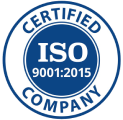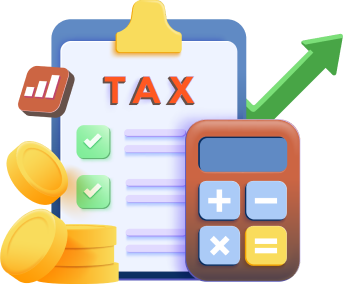Income Tax Return (ITR) Filling
Starting from ₹1,000 + GST




Table Of Content
Filling IT Return
Income tax return (ITR) filing is one of the important processes that is regulated by the Indian government for individuals and entities that have income above a certain threshold. Filing of ITR allows taxpayers to declare their income claim applicable deductions and also pay if there is any tax liability applicable to them.
One should understand the importance of this financial formality as it has a significant role in financial management and it includes claiming funds application for loans and also ensures that there is compliance with the task regulation that is regulated by the government of India.
Benefits of Filing ITR Return
Claim Tax Funds
This allows you to claim back the amount or fund which you have paid in advance. It is usually done when you have paid more than the tax that is required through TDS or advance tax.
Necessary for Loans and Credit Cards
Often there is a requirement for ITR receipts for approving loan and credit card applications as these also reflect your financial credibility.
Visa Applications
ITR applications also play a very important role in visa processing for certain countries as they ensure that you are financially competent enough to survive there.
Proof of Income
ITR also acts as proof of income especially when you are a self-employed individual or any kind of professional.
Avoid Penalties
Filing of ITR also helps and avoids the deadline which saves you from penalties for non-compliance and insurance that you stay within the boundaries of the law.
Eligibility for Filing ITR
Process of Filing ITR
Step 1
Gather all the essential documents
Before filing your RTR make sure that you have all the necessary documents that are required while filling your ITR form. All the documents are mentioned above.
Step 2
The correct ITR Form
There are different forms based on your income sources. You need to select the right one depending on which age criteria and income criteria you fall into.
Step 3
Register into the Income Tax e-Filing Portal
After the selection of the correct ITR form, register using your PAN card number if you are a first-time user or login to the portal using your existing credentials.
Step 4
Fill in the necessary information
After registering and logging in to the portal, fill up the ITR form with information like your name, address PAN number, Aadhaar number, salary, business income, capital gains, interest income, etc. Also enter The eligible deductions under sections like 80C ( PPF, LIC).
Step 5
Verify Your Tax Liability
After filling in the required information your tax liability will be automatically calculated based on the details you have provided. You can update the payment details in your ITR. And if you are eligible for a refund the amount will be processed after a return is filed.
Step 6
Submit the ITR
Finally, review your form and submit it.
Documents required for ITR filing
FAQs
What happens if I miss the ITR filing deadline?
You can file your belated ITR by the 31st of December of the assessment year, but if you still miss the date, you may face some penalties and interest on any unpaid tax.
What if I do not have taxable income? Should I still file an ITR?
It is not compulsory to file an ITR if your income is not taxable. However, it is always recommended to file an ITR to maintain a record of financial status, and it is also useful in loan sanctions and Visa applications.
Do I need to file an ITR to earn income from abroad?
Yes, it becomes compulsory to file an ITR to disclose foreign income or assets, even if it is below the taxable limit in India.
Can I revise my ITR after submission?
Yes, you can revise your ITR return by December 31st of the assessment year.
Pricing & Packages
Silver
₹24,999 / Month
- Appointment of Auditor
- Issuance of share certificate
- INC 20 A form filing
- DIR 3 KYC (For 2 directors)
- Accounting & Bookeeping(Upto 100 transactions)
- Financial statement preparation
- Accounting software (1-year license)
- AOC 4, MGT 7 & ADT 1 filing
- Annual filing(Upto turnover of 20 lakhs)
- Facilitation of Annual General Meeting
- Statutory regulations PF, ESI
- One Year Income Tax filing(Upto turnover of 20 lakhs)
Gold
₹34,999 / Month
- Appointment of Auditor
- Issuance of share certificate
- INC 20 A form filing
- DIR 3 KYC (For 2 directors)
- Accounting & Bookeeping(Upto 100 transactions)
- Financial statement preparation
- Accounting software (1-year license)
- AOC 4, MGT 7 & ADT 1 filing
- Annual filing(Upto turnover of 20 lakhs)
- Facilitation of Annual General Meeting
- Statutory regulations PF, ESI
- One Year Income Tax filing(Upto turnover of 20 lakhs)
- Preparation of Minutes & Filing of AGM Report
- GST Returns Filings (12 Months)
- Dedicated account manager
- Consultation with CA, CS & Lawyer
Platinum
₹49,999 / Month
- Appointment of Auditor
- Issuance of share certificate
- INC 20 A form filing
- DIR 3 KYC (For 2 directors)
- Accounting & Bookeeping(Upto 100 transactions)
- Financial statement preparation
- Accounting software (1-year license)
- AOC 4, MGT 7 & ADT 1 filing
- Annual filing(Upto turnover of 20 lakhs)
- Facilitation of Annual General Meeting
- Statutory regulations PF, ESI
- One Year Income Tax filing(Upto turnover of 20 lakhs)
- Preparation of Minutes & Filing of AGM Report
- GST Returns Filings (12 Months)
- Dedicated account manager
- Consultation with CA, CS & Lawyer
- TDS filing for 1 year
- Payroll service (Up to 5 employees)
